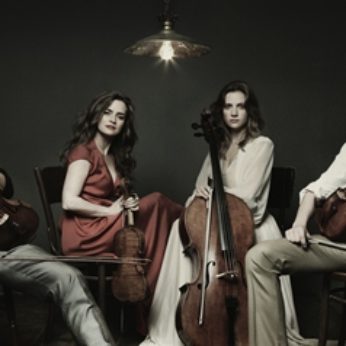Composer: Pyotr Ilyich Tchaikovsky (b. 1840 - d. 1893)
Performance date: 29/06/2013
Venue: Bantry Library
Composition Year: 1876
Duration: 00:35:49
Recording Engineer: Damian Chennells, RTÉ lyric fm
Instrumentation: 2vn, va, vc
Instrumentation Category:String Quartet
Artists:
Kelemen Quartet (Barnabás Kelemen, Gábor Homoki [violins], Katalin Kokas [viola], Dóra Kokas [cello]) -
[quartet]

Tchaikovsky is of course best known for his
ballets, symphonies, concertos and operas, but he also wrote three magnificent
string quartets. The first two are comparatively early works; but his third and
last quartet was composed in 1876, when he was approaching the peak of his
powers. It was written as a tribute to the memory of the popular violinist
Ferdinand Raub, his friend and Moscow Conservatoire colleague, who had led the
premieres of his first two quartets, and who had died the previous year. Nearly
a century later Shostakovich was to pay similar tributes to the four members of
the Beethoven Quartet, who premiered nearly all of his string quartets.
This is a highly dramatic and large-scale
work that is almost overwhelmed by a sense of unbearable loss. It opens with a
long, slow introduction lasting over four minutes, thus almost a movement in
itself. The core of this introduction is a passionate melody for the first
violin that vividly depicts the composer’s sorrow at the death of his friend.
Eventually we are gently drawn into the main Allegro, which begins with a comparatively undemonstrative theme
that nonetheless generates some impassioned outbursts. The movement closes with
a shortened version of the opening introduction. The brief and lively Scherzo
provides an energetic and witty interlude between two very heavyweight
movements. There is a folk-like Trio with a gentle, lilting tune and a dark
colouring.
The Andante
funebre e doloroso speaks from the heart. It opens in much the same
brooding style as the introduction to the first movement, but the passion is
more restrained and soon leads into a mournful funeral chant. This in turn
gives way to a long, muted central section that seems to have all passion spent
until the loss and sadness once more wells up as the funeral chant tries again
to impose itself. Right at the end and quite unexpectedly the music shimmers
with a glimpse of hope as it soars above the earthbound chanting.
The Finale states very firmly at the outset that life
should reassert itself and, with its scherzo-like character, sets out to
dissipate the mood of tragedy. A number of jovial themes are bundled together
and driven along at a headlong tempo. However the attempt at cheerfulness has a
forced and unconvincing air and just before the hard-driven conclusion the
funeral chant is chillingly recalled.
Copyright © 2025 West Cork Music. All rights reserved.
Designed and developed by Matrix Internet